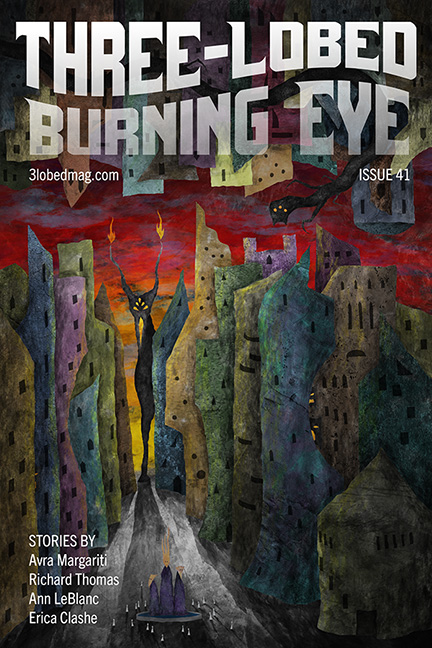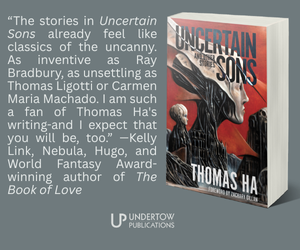Not the Act
by Erica Clashe
3115 words
© 2024 Erica Clashe
Listen to this story, narrated by the author
I feel sick with this love that won’t die. What they call mad love. It’s dreadful, my only real love and she’s a terribly cruel person. A kidnapper, and some kind of Satanist too. I could die. Damn it all, I am dead. Consider me done for.
• • •
We met in Chicago. I was a stagehand at The Folly, a theater they played. Their previous driver, a man named Matthew, puttered out on them. Disappeared for some better gig.
I joined their tour because I wanted to flee the city. I was fleeing a lover turned enemy, a woman taller and stronger than myself which is absolutely unacceptable. The Briarsons called me Philly, like everyone else. My real name’s Cecily Philstein. I don’t look much like a Cecily. My face is as blunt and broad as a Neanderthal’s. My shoulders are larger than most men’s. I smell of sawdust and oil, the stuff of my existence. Those who named me Cecily have long ago parted ways with me.
The Briarsons knew about me and my ways. They didn’t care, not really. Though Mrs. Briarson was stern enough about it. “Don’t be caught,” she warned.
Mr. Briarson was gentler and more irritating. Sympathetic show and prurient interest. He’d assure me of his happy understanding, his embrace of personal liberties. All the while he’d attempt to draw out stories about my scandalous experiences. If I ever divulged, surely he would be disappointed. Maybe even horrified.
The Briarsons and I hit vaudeville theaters throughout the country, from Kansas City to D.C. There was a lot to keep track of. A quart of little boys. Is that understandable? I mean to say they’re like twins, only doubled: I’m not sure what you call that.
Then there was the talking parrot, Blueberry. Named after the blue spot blotching her left eye. Absolutely central to the act. Sang with the boys, and the songs were about her. The boys would come out in their Sunday best, red-striped suits and fabric sunflowers in their lapels. Musically prattle on about an opera star direct from Italy. The smallest singer in the world, they’d boast. Whole lot of hooey. Audiences loved it. They ate up the parrot. Blueberry’s big reveal always scored laughs. People loved her squeaky squealing voice singing, “I’m the Prima Donna hacker, I always wan’ a cracker!” I can’t forget that lyric no matter how hard I try. But the boys carried the bulk of the tune, repeating the bird’s memorable introduction with a certain maniac glee. They had a funny parrot dance and offered crackers in this ridiculous adoring fashion. Blueberry was maybe the most talented of the gang.
• • •
Mr. Briarson was touched with hometown pride. His city begat vaudeville, he’d moon on. And that was why the theater was in their blood. Irreplaceable natural talent, something in the air of the place, and on and on he’d go. He took it as a personal betrayal, the precious Blueberry stolen in his home dominion. Not to mention one of the boys was taken too. Teddie or James, I forget which one. Not that the criminals intended on taking him too. He heard their dawn intrusion, caught them in the act. Chased the criminals and everything, down the street crying and carrying on like mad, the freak. Most children are freaks. Running after murderous kidnappers and nonsense like that. Beasts are smarter.
The Briarsons overflowed with concerns for the captive parrot. Mrs. Briarson exploded. Special diet, a picky eater, required pistachios and cranberries, wouldn’t touch anything else, and “oh no,” she said, very bleak, “what if these bastards let her starve.” The boy was not mentioned.
They didn’t know the kidnappers were other performers. The Briarsons theorized plenty. Personal enemies did this to them, they concluded. It must be someone connected, someone local, a Bostonian. They had no idea.
• • •
She waited in the wings with two men, striking in their tuxedos and silky shiny top hats. I saw them from the other side of the golden proscenium, a head-on look. She disrupted my disinterested backstage wandering, idly inspecting the backdrop’s corroded telescoping poles, waiting for the show to end when I could bring the Briarsons home, and completely bored. Wasn’t expecting to be transfixed, to be riveted, a set lightbulb done up in torching. That’s what seeing her did to me. She was a vision out of nowhere.
I stared. She stared, but not at me, I was sure. Her gaze landed in another dimension, I thought. Melancholy brown eyes, wonderfully focused. I thought she was looking past me.
Shoddy stage lighting traced her figure, but in my memory she wasn’t dim, no shadows. Washed crisp in spotlight, the way I saw her. Radiant in her crown of perfect ringlets.
I couldn’t move until she did. Time stopped passing. It evaporated.
Then there was their act, I’ll get back to that. Let’s hop ahead to after the show, that’s the better part. It’s a normal night of work. I’m driving the gang back to their modest brownstone residence. Never saw the interior by the way. Mrs. Briarson insisted I leave their belongings at the doorstep.
I finish all my tasks, return the automobile to its little stable. I say goodbye to it even though it’s just a machine, because it feels like someone who works with me. I’m not far off the property when I go in my pocket for a cigarette. I feel a slip of paper. Folded into a tight square. So tight at first I thought it was a blade, and I’d been stabbed and somehow hadn’t noticed. I don’t know, that’s just where my mind went. I pull out the innocent paper with some relief.
I know it’s a note from her, or maybe it’s hope, but it really feels like I knew. I unfold it, there's a message in green ink. “Meet me in the theater alley, midnight. Come alone.”
I’m stunned. I almost talk back to the letter. Slack jawed. I don’t know you, I want to say. We haven’t talked. I don’t know what this is. I’m familiar with secrecy, by golly it’s required in this sort of thing. But this was too theatrical for comfort.
I’m spooked by how the letter joined my person without my notice. I dimly remember Ambrosia walking past me, exiting the stage, but I lost myself as she neared. My present turned into a memory and it was all shot through with light, like a picture show. She could have shoved me and I would have remained as set as a post.
I say I won’t go to the alley at midnight, but midnight comes and I go. I walk back to the theater, past blocks of nearly uniform three-deckers. From the way they look at me, the few other night walkers take me for a man.
I know it will be Ambrosia waiting for me in the shadowed alley. She’s darkened in a large black fur coat. Approaching, I see her grin, sweet, actually nervous. My insides open out realizing she’s staring at me the way she had been backstage.
We don’t say hello. She shapes her head to my collarbone, arms sliding around my waist, as mine coil around her. Intending to have a closer look of her, I shift my head into an unexpected, but not surprising, kiss. Nothing surprises. My tongue and her teeth. Lower lip bit and it feels like my mouth is surfacing from a lifetime concealed. It’s like we were apart forever and we’ve been reconnected. Something lifts inside me, the strain I didn’t know was there is released.
We haven’t said a word, but we haven’t been silent either. We know each other, anticipating in our bones, every gesture and touch. I volcano, I don’t have a better word for what happened inside me. I don’t mean a metaphor for an orgasm! I mean my insides funnel up and boil my brain, obviously. For those moments I was gloriously not a person.
She fills her chest against me and my hands take in her curves. Then she thrusts herself a little against me. We’re kissing I don’t know how long. Our tongues explore and we learn our flavor.
I fear losing my breath and move from her lips to claim her ear. Licking, sucking, sticking in my tongue. Frightened by the intense feelings her gentle moans inspire, I pull away. She opens her eyes and looks at me hungrily.
“Why’d you stop?” she asks me, voice dreamy thin, vastly different from her stage projections.
“We’re outside,” I say, annoyed. Mostly with myself for stopping. I could have stayed hours in her embrace. And it wouldn’t have been enough. I should have kept going with whatever it was we were doing. If I kept going then, then I could keep going now, putting it all to words, reliving it. Making it go forever.
I want this moment packaged by itself. Separate from all the bizarre occurrences and crimes. But I want a full picture too. I want to know what happened to me. What’s happening to me.
• • •
Surprising to see a spiritualist act in these modern times. Maybe on the west coast, but not in places like Boston. All those Houdini exposures, it’s hard to impress people with that sort of thing.
But Ambrosia astounded that night. Faced the audience with a brilliant gaze. Held them in the wet light of her bold, brown eyes. She settled into expectant quiet, until the amused expressions twisted with impatience and an uneasy air of mystery. Finally, she grandly announced her intention of establishing communication with “a creature of your psyche.” That phrase thorned into my brain. Still not sure what she meant. Irritated and confused, I listened. The whole audience listened in a similar state. Her pair of formal gentlemen waited behind her, hands behind their backs. I think they were on stage to make the whole thing appear respectable.
Ambrosia’s husky voice was a smooth surface, perfectly even, like cut marble. Soft in my ears. She explained something about demons and angels living in our brains. “Our inhabitants,” she called them.
Audience restless, Ambrosia claimed to be allied with something named Splenditello. A demon or an angel, she said no one was sure what this Splenditello fellow was—who isn’t a fellow, or a woman, or anything we know of. These creatures don’t have bodies, she said. They don’t have sexes like animals do.
She announced a demonstration, promising everyone the chance to channel Splenditello, like it was this big favor. She said she would contact the thing and distribute its “lifeforce” throughout the theater. Her connection with it was that powerful. She said this thing resides in our thoughts, weird claims. If I weren’t terribly attracted, I would have been as restless as the audience.
But then her channeling began, and the mood shifted. Lips a tiny circle, she hummed a strange sound. A high whistle that didn’t sound human. The air unfolded into a silence sliced through by her piercing noise.
Then she exploded with laughter. It wasn’t a right laugh. Teeth like a horse’s protruded out of her mouth, boxy and enormous. Her face became a breaking wave. Distorted, sagging down, it broke into little drops, then rose, and crested. These optical motions repeated in rhythm with her animal mad laughs. Everyone gasped, including me. A visual illusion, I told myself with some panic, but it wasn’t long before everyone in the auditorium laughed along with her in perfect pitch and time. A theater drowning in a choir of frenzied, giddy shrieks. Their faces breaking into waves.
It’s a cloudy memory. The breathless croaking impossible laughter. Overwhelming buoyancy. We rose. We floated. I don’t know how long it lasted, but the end was sudden. Reality clicked back into shape. Ambrosia stood on the stage as before, plainly. Her face perfect and unreadable. She said “thank you,” bowed, and, trace of a smile, reminded us Splenditello was always with us, always in our thoughts.
• • •
I tried walking away after she asked. She took my hand and I would have walked with her anywhere she wanted to go.
People vanished from the dark streets. So quiet I could hear electric lamps whir, like insects flying by. Blessedly without words, we walked hand-in-hand. I brought her to the Briarson’s, and I walked away. Off to my crummy boarding house home for the night. I refused to look back but I know Ambrosia watched me. I felt her stare with every inch of me.
I’m lying. I didn’t walk home. I ran.
• • •
The task was given to me. The Briarsons demanded justice without the courage to seek it themselves. They wanted their parrot back. They wanted their act. I agreed to do everything they said, downcast.
My walk to our second encounter was like stepping deeper and deeper into a new body. A rawer body. It was another cold empty night, the darkness messed up with mist. On the verge of rain.
This time, Ambrosia wasn’t alone. In front of her, a hand on each shoulder of the Briarson boy whose name I forget. He was pink and scrunchy from weeping. Behind her, the two men from the act, in black trench coats. As dour and unreadable as ever. She introduced them as her brothers. They didn’t talk.
I said I wasn’t interested in her family. I hated the position I was in, and I spilled my anger on her. I demanded she release the boy, and she did. The boy ran forward and clung me. I held out my arms free, tried not to show my discomfort. None of the Briarsons had ever shown me such contact.
“What did you do to him?” I asked.
“Nothing. He’s upset about the bird,” Ambrosia said. Then added, “It’s not like we made him watch.”
“What happened to the bird?”
Ambrosia frowned in disappointment. “The truth is obvious. Always is.”
The boy finally released my waist. But still tucked into my side, embarrassed.
“Why?” I asked, for the sake of my feelings for her. I wanted to know her spirit, wanted it close, everything about her. “What’s this all about?”
“I didn’t want to use you,” she said. Regret in her eyes, I’m sure she meant it. “I’m sorry it happened like this.”
I ignored her unsettling guardian brothers. It was only us two. “I’m not complaining,” I pointed out before asking, “Did you hypnotize me, like in your act?”
A pulse of shame flickered through her face. “What I did to you, what we did, it wasn’t like the act at all.”
The brother on her right whispered in her ear. Another pulse of shame. Then weariness set in. “We must go,” she said.
“Wait,” I’m mortified to say my voice creaked with unwanted emotion. “I deserve an explanation, what’s all this about?”
Ambrosia’s brothers began to move her backward, but she had time to consider her reply. “Power.” There was a pause where she stared at me with her otherworldly expression.
Real as anything, a kiss hit my lips, without physical contact. Touch of her taste in my mouth, impossibly close. But everything about us is impossibly close.
“I’m sorry,” she repeated. And she was gone.
She left me in an astounded blank, hand over my gasping mouth. I think the boy led the way back. My memories fade. I barely recall him telling me it was the color of Blueberry’s feathers they wanted. He said their demon Splenditello has a thing for blue and green. They needed a living price, some kind of sacrifice.
• • •
I can’t hope to catch her act again. Vaudeville died. The Briarsons claim it died in Boston. They say it died with their precious Blueberry.
I don’t care about what Ambrosia did to that bird. I don’t care how wrong and frightening the whole business is. Suits me. I’m wrong. I’m frightening. If it helped me find her, I’d kill a billion parrots.



